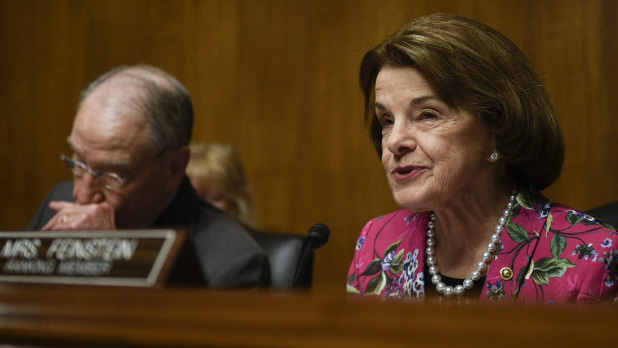Chineese spies have infiltrated the highest levels of government and are now leveraging a mojor political party to create social unrest in the US.
***Article first published by 'The New York Post' on Aug. 8, 2018***
As vice chair of the Senate Judiciary Committee and a ranking member of the Senate Intelligence Committee, Dianne Feinstein (D-Calif.) has been investigating allegations of President Trump’s “collusion” with Russia.
But now we learn Feinstein may be the one compromised by a foreign power.
Turns out that Communist China had a spy in her office. A 20-year employee of Feinstein’s, the agent had been reporting back to China’s Ministry of State Security for well over a decade before he was caught in 2013, according to the FBI.
A Chinese-American who doubled as both an office staffer and Feinstein’s personal driver, the agent reportedly was handled by officials based out of the People’s Republic of China’s consulate in San Francisco, which Feinstein helped set up when she was mayor of that city. He even attended consulate functions for the senator.
Feinstein says she took the staffer off her payroll “immediately” after the FBI informed her five years ago that her office had been infiltrated by Chinese intelligence, and agents had identified the mole in a briefing. In a statement, the Democratic senator insisted he had “no access to sensitive information” and that he was never charged with espionage.
In June 1996 — after the staffer had begun working for Feinstein — the FBI detected that the Chinese government was attempting to seek favor with the senator, who at the time sat on the East Asian and Pacific affairs subcommittee of the Foreign Relations Committee, which oversees US-China relations. Investigators warned her in a classified briefing that Beijing might try to influence her through illegal campaign contributions laundered through front corporations and other cutouts.
The warning proved prescient.
One Chinese bagman, Nanping-born John Huang, showed up at Feinstein’s San Francisco home for a fundraising dinner with a Beijing official tied to the People’s Bank of China and the Communist Party Committee. As a foreign national, the official wasn’t legally qualified to make the $50,000-a-plate donation to dine at the banquet.
After a Justice Department task force investigated widespread illegal fundraising during the 1996 Clinton re-election campaign, Feinstein returned more than $12,000 in contributions from donors associated with Huang, who was later convicted of campaign-finance fraud along with other Beijing bagmen. The DNC and the Clinton campaign had to return millions in ill-gotten cash.
Still, Beijing got its favored trade status extended — thanks in part to Feinstein. In speeches on the Senate floor and newspaper op-eds, she shamelessly spun China’s human-rights violations, as when in 1997 she compared Beijing’s 1989 massacre of hundreds of young demonstrators to the 1970 Kent State shootings, calling for the presidents of China and America to appoint a human-rights commission “charting the evolution of human rights in both countries over the last 20 to 30 years,” that “would point out the successes and failures — both Tiananmen Square and Kent State — and make recommendations for goals for the future.”
Feinstein also led efforts to bring China into the World Trade Organization in 1999, which gave Beijing permanent normal trade relations status and removed the annual congressional review of its human-rights and weapons-proliferation records.
Feinstein, still among the Senate’s most influential China doves, travels to China each year. Joining her on those trips is her mega-millionaire investor husband, Richard C. Blum, who has seemingly benefited greatly from the relationship.
Starting in 1996, as China was aggressively currying favor with his wife, Blum was able to take large stakes in Chinese state-run steel and food companies, and has brokered over $100 million in deals in China since then — with the help of partners who sit on the boards of Chinese military front companies like COSCO and CITIC.
China investments have helped make Feinstein, who lives in a $17 million mansion in San Francisco and keeps a $5 million vacation home in Hawaii, one of the richest members in Congress.
Feinstein has insinuated that Trump is compromised by a foreign power. But it’s clear Feinstein has an alarming blind spot when it comes to China and national security.
Paul Sperry is a former Hoover Institution media fellow.
